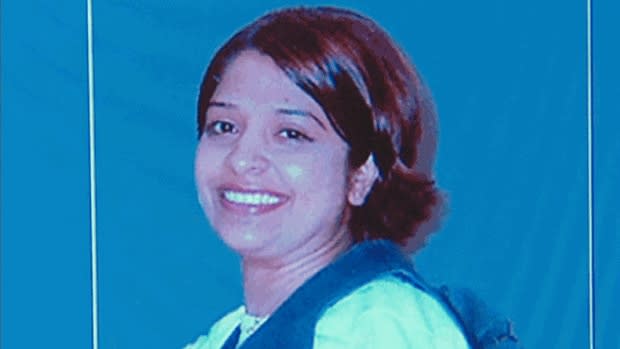Man who beat wife to death in Fredericton seeks parole 10 years early
A New Brunswick man convicted in 2004 of first-degree murder in the beating death of his estranged wife was back before the courts last week in hopes of being granted parole 10 years early under a rarely used section of the Criminal Code.
Abdul Bari, 52, is serving a life sentence with no parole eligibility for at least 25 years for killing Shaila Akther Bari, 26, a part-time business student at the University of New Brunswick in Fredericton.
Police found her body in her single-room apartment on Regent Street on July 22, 2003, after her friends reported her missing. She was on a bed with pillows over her face.
Her jaw was broken in at least two places, at least four ribs were fractured, the back of her head was cut and blood was coming from her nose and mouth.
She died from a combination of a sharp- and blunt-force trauma to the head and chest followed by suffocation.
Forensic evidence revealed a pry bar could have been used to inflict some of her injuries.

Bari, whose bank card was used to purchase a pry bar from a local Canadian Tire the same day the victim was last seen alive, was found guilty in September 2004 of murder.
Last Wednesday, Bari had a court appearance in Saint John Court of Queen's Bench via teleconference from Dorchester Penitentiary — the early stages of a lengthy, complicated process that could require a jury being empanelled and also involves a constitutional challenge.
Under the Criminal Code of Canada, anyone convicted of first-degree murder must serve at least 25 years before being eligible to apply for parole.
But Bari has applied to the Court of Queen's Bench for a judicial review of his sentence under a now-repealed section commonly known as the "faint hope clause."
Section 745.6 of the code gave convicted killers with a parole ineligibility period of more than 15 years the opportunity to apply for early parole after serving at least 15 years. It was repealed in 2011 but still applies to crimes committed before that date.
Extremely rare in province
"It's not something that happens very often," Sarah White, one of the two state-funded lawyers handling Bari's application, told CBC News.
In fact, there has only ever been one other application made in New Brunswick, according to the best knowledge of the lawyers involved, court documents indicate.
According to Correctional Service Canada statistics, about 1,000 prisoners have been eligible to apply for early parole under the faint hope clause since 1976. Information about how many have applied was not immediately available, but about 130 have received parole, and 14 of them have been returned to prison.

White acknowledged some people may find it "difficult to understand" how someone convicted of first-degree murder can ask to get out of prison early.
"In some ways, people may think he's coming to the court asking for more lenience, but this is something that has been included in the Criminal Code," she said.
"Sometimes I explain to people it's not called punishment Canada, it's called Corrections Canada. … There certainly is a punishment element that is required, but once you're in Corrections, the focus is rehabilitation. Get yourself into a place where you're able to return to society and be a functioning member of society while also paying your dues."
She described Bari as a "peaceful prisoner," who has made "significant efforts toward his rehabilitation."
'Model prisoner'
Bari, who once sought leave to appeal his conviction to the Supreme Court of Canada, now accepts responsibility.
"I acknowledge my crime and have developed positive insight into my actions," he said in a sworn affidavit filed with the courts in April.
He describes himself as a "model prisoner, with negligible institutional charges."
"There are no allegations of violence within my institutional record," he said.
He has successfully completed all rehabilitative programs offered to him in prison and continues to "demonstrate positive behaviour," he said. "I am known to be polite and helpful."
Bari said he's requesting the opportunity to have his parole ineligibility period reassessed by focusing on the "steady progress" he has made in the past 15 years.
He has "cascaded" from maximum security to minimum security, he said, and been granted four temporary escorted absences in the community by the National Parole Board, which were all completed "without issue."
He has been classified as a "low range risk for general violence and in the moderate [range] for risk of violence within a relationship," according to his affidavit.
White said she's "hopeful" Bari will at least get through the first phase of the multi-staged application process, which is judicial screening.
Court of Queen's Bench Chief Justice Tracey DeWare must first review Bari's file to determine whether he has a chance of success of getting through the next stage — his application to a jury.
According to the New Brunswick Rules of Practice, some of the information that would be reviewed would include Bari's prison conduct, classification and discipline, details from any psychological and psychiatric assessments, his social and family background, and other relevant information regarding his character.
If DeWare decides to forward his application to the next stage, a jury would be empanelled in Fredericton, where the crime occurred.
If the jury reaches a unanimous decision to reduce his period of parole ineligibility, Bari would be allowed to apply to the parole board for early parole.
White expects the process could take about 18 months.
Seeks 'relatively low bar of screening'
Setting a date for DeWare's review hit a snag last week when Bari's lawyers and the Crown could not reach an agreement on what screening threshold the chief justice should use in deciding whether to send the application on to a jury.
The Crown contends the application should only go to the jury if DeWare is satisfied, on the balance of probabilities, that there's a "substantial likelihood" the jury would unanimously agree to reduce the parole ineligibility, which is the current standard, established in 2011.
But White and co-counsel Grace MacCormick of Truro argue the standard should be "the lesser, and relatively low bar of screening referred to as 'reasonable prospect' of success" — the standard that existed at the time of Bari's crime, conviction and sentencing.
"The retrospective application of the higher standard of 'substantial likelihood of success' … infringes on Mr. Bari's constitutional rights," they argue in a charter application filed with the court. They cite a 2018 Ontario Court of Appeal decision.
New Brunswick is not bound by the Ontario court's decision, however.
Bari's case could be precedent-setting for New Brunswick.
The parties agreed the federal attorney general should also be given an opportunity to weigh in on the matter, so the case was set over last week for another teleconference on Jan. 7.
"OK," said Bari.
State-funded lawyers
Last summer, DeWare granted Bari's request for state-funded legal counsel to pursue his application under the faint hope clause.
Bari had previously been denied legal aid and unsuccessfully appealed that decision. In 2018, the New Brunswick Legal Aid Commission told him his "complex" application would "fall well above the maximum budgeted limit of $50,000 per case."
But DeWare ruled the cost of Bari's application was "not an appropriate justification for the denial of his right to counsel."
She said his charter right to a fair hearing might be compromised if he weren't represented by counsel.

"Given the applicant's background, limited education and challenges with the English language, it is difficult to imagine how he could meaningfully prosecute the matter on his own behalf," DeWare wrote in her 12-page decision, dated July 11.
Bari, a native of Bangladesh, can read English but has difficulty with writing, according to her decision.
He completed a year and a half of a bachelor of arts in Bangladesh before moving to Canada in 1993. He worked at a hotel in Fredericton for 12 years before his conviction and obtained his Canadian citizenship in 1998.
During his incarceration, Bari taken English-language training and is working on his GED. He earns $60 a month working in the prison, has about $4,000 in a savings account and up to $8,000 in debt.
His family members all work for minimum wage and are not able to contribute to his legal costs, the court heard.
"Given the challenges presented by the complexity of the matter itself, coupled with the applicant's limited education and resources … the applicant would be deprived of a meaningful ability to pursue his application," DeWare ruled.
And the application "does pose a serious threat to his rights of life, liberty and security," she added.
White said she and MacCormick are working at legal-aid rates and were previously working pro bono.
Previously charged with criminal harassment
Akther Bari, also a native of Bangladesh, had moved to Fredericton in 1997 as part of an arranged marriage. The couple separated in August 2002, about a year before the murder.
The separation was Akther Bari's decision, according to court records. Bari was "devastated by her actions and felt betrayed," the records state.
Akther Bari, meanwhile, felt harassed by her estranged husband. Between September and December 2002, he frequently harassed her by showing up at her apartment unannounced and at other places where she was, without any apparent reason for being there, according to the documents.
She complained to police about the harassment to try to get a restraining order against him and asked her landlord to change her door lock and put iron bars on her window because she was afraid of Bari.
Bari's hope for reconciliation eventually turned to despair and later to anger, to the point that he stated [in letters] that if Ms. Bari did not return to him, she should not be allowed to live. - Court of Appeal of New Brunswick decision
In September, she called police to report that Bari went to her apartment and wanted to have sex. When she refused, he became upset and got a knife from the kitchen. She fled to a neighbour's.
In November and December 2002, she reported he had been looking through her apartment window, followed her to the mall and bothered her and her friends, and stared at her at the university campus.
Bari was charged with criminal harassment, pleaded guilty and was sentenced on June 16, 2003.
"Bari's hope for reconciliation eventually turned to despair and later to anger," according to the court documents.
In letters to relatives in Bangladesh, he said, "if Ms. Bari did not return to him, she should not be allowed to live," the documents say.
The letters depict "a husband devastated by his separation from his wife; a jealous, possessive, angry, humiliated and betrayed man, stripped of everything of value to him; a man unable to cope with his separation and his estranged wife's lifestyle."
Last seen studying for exam
On July 15, 2003, Akther Bari was studying at the university library for an exam the next day. She was last seen alive walking around 9:30 p.m. and last heard from about an hour later, when she spoke to a friend on the phone. The last documented activity on her laptop was at 1:17 a.m.
Akther Bari never showed up for that exam, and no one heard from her again.
She had been dropped off at a nightclub around midnight that night, Bari's trial heard. His whereabouts between 1:52 a.m. and 5:41 a.m. on July 16 could not be accounted for.
On July 24, after it was known Akther Bari's body had been discovered, Bari asked a co-worker to purchase a pry bar for him.
"The co-worker found this request rather strange, refused to make the purchase, and reported the conversation to the police," court documents state.

On Sept. 27, police again searched the area surrounding Akther Bari's apartment building and found, about 55 metres away, a pry bar like the one purchased on July 15 with her husband's bank card.
Although no forensic evidence linked the pry bar to the murder scene, it couldn't be ruled out as a means of prying open the victim's apartment door.
Police had already discovered yellow latex gloves with Bari's DNA on them several metres from where the pry bar was found.
The investigation revealed gloves of that type were not available in Fredericton stores but were used by a few local businesses, including the hotel where Bari worked, and where the gloves were readily accessible to employees.
On Feb. 8, 2004, police searched Bari's residence and found a Mastercraft pry bar.
The jury heard three weeks of testimony, translated into Bengali, and deliberated nine hours before reaching a guilty verdict.
Shortly after being convicted, Bari began breathing rapidly and appeared to have some kind of seizure. He collapsed on the floor convulsing and could be heard repeating the phrase, "Everybody lie."
The New Brunswick Court of Appeal dismissed Bari's conviction appeal in December 2006 and the Supreme Court of Canada dismissed his application for leave to appeal in October 2007.


